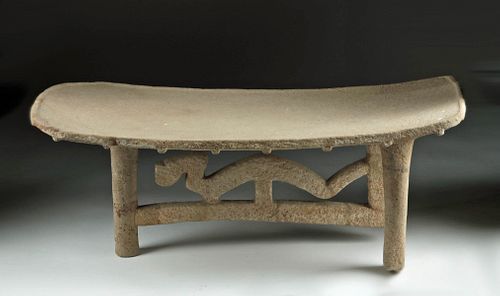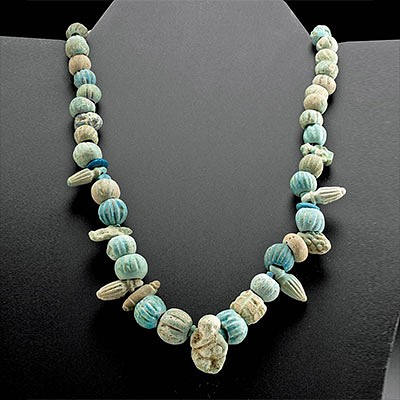Huge Costa Rican Stone Flying Panel Metate w/ Snake
Lot 107c
About Seller
Artemis Fine Arts
686 S Taylor Ave, Ste 106
Louisville, CO 80027
United States
Selling antiquities, ancient and ethnographic art online since 1993, Artemis Gallery specializes in Classical Antiquities (Egyptian, Greek, Roman, Near Eastern), Asian, Pre-Columbian, African / Tribal / Oceanographic art. Our extensive inventory includes pottery, stone, metal, wood, glass and textil...Read more
Estimate:
$6,000 - $8,000
Absentee vs Live bid
Two ways to bid:
- Leave a max absentee bid and the platform will bid on your behalf up to your maximum bid during the live auction.
- Bid live during the auction and your bids will be submitted real-time to the auctioneer.
Bid Increments
| Price | Bid Increment |
|---|---|
| $0 | $25 |
| $300 | $50 |
| $1,000 | $100 |
| $2,000 | $250 |
| $5,000 | $500 |
| $10,000 | $1,000 |
| $20,000 | $2,500 |
| $50,000 | $5,000 |
| $100,000 | $10,000 |
| $200,000 | $20,000 |
About Auction
By Artemis Fine Arts
Mar 4, 2021
Set Reminder
2021-03-04 10:00:00
2021-03-04 10:00:00
America/New_York
Bidsquare
Bidsquare : Ancient | Ethnographic Art Through The Ages
https://www.bidsquare.com/auctions/artemis-gallery/ancient-ethnographic-art-through-the-ages-6467
Ancient art from Egypt, Greece, Italy and the Near East, as well as Asian, Fossils, Pre-Columbian, Native American, African / Tribal / Oceanic, Fine art, and much more! All categories, all price ranges... all legally acquired and guaranteed to be as described or your money back. Artemis Fine Arts info@artemisgallery.com
Ancient art from Egypt, Greece, Italy and the Near East, as well as Asian, Fossils, Pre-Columbian, Native American, African / Tribal / Oceanic, Fine art, and much more! All categories, all price ranges... all legally acquired and guaranteed to be as described or your money back. Artemis Fine Arts info@artemisgallery.com
- Lot Description
Pre-Columbian, Central America, Costa Rica, Atlantic Watershed region, ca. 1st to 5th century CE. An enormous flying panel ceremonial metate, expertly carved from a single piece of volcanic stone with refined dimensions and intricately shaped zoomorphic embellishments. The flat metate face is slightly recessed and surrounded by a thick border decorated with a fringed lower edge. The metate itself is supported by three thick conical legs. On the underside is a large, abstract serpent form that seems to slither along a flat support band that joins two of the legs together. Size: 33.5" L x 17.2" W x 13.75" H (85.1 cm x 43.7 cm x 34.9 cm)
This ceremonial metate carved from volcanic stone represents one of the most unusual traditions of the ancient Americas. While some metates were used as grinding slabs, others showing more intricate designs like this example were intended for ritualistic ceremonies and as burial offerings. It has also been suggested that some metates were actually used as thrones for rulers to sit on. The iconographic/decorative program of this metate suggests a ceremonial function. The ornament may be related to the owner the piece or the ritual in which the metate was used. Alongside the jaguar, the serpent was the most important symbolic animal in ancient Central America.
For a stylistically-similar example featuring primarily jaguars, please see The Metropolitan Museum of Art, accession number 1986.200: https://www.metmuseum.org/art/collection/search/314952
Provenance: private Sneed collection, West Palm Beach, Florida, USA collection, collected before 2005
All items legal to buy/sell under U.S. Statute covering cultural patrimony Code 2600, CHAPTER 14, and are guaranteed to be as described or your money back.
A Certificate of Authenticity will accompany all winning bids.
We ship worldwide and handle all shipping in-house for your convenience.
#145021Repaired from multiple large pieces with resurfacing and adhesive residue along break lines. Minor abrasions to top, legs, and carved animals, with softening to some finer details, and light encrustations within some recessed areas. Light earthen deposits throughout.Condition
- Shipping Info
-
All shipping is handled in-house for your convenience. Your invoice from Artemis Gallery will include shipping calculation instructions. If in doubt, please inquire BEFORE bidding for estimated shipping costs for individual items.
-
- Buyer's Premium



 EUR
EUR CAD
CAD AUD
AUD GBP
GBP MXN
MXN HKD
HKD CNY
CNY MYR
MYR SEK
SEK SGD
SGD CHF
CHF THB
THB
















